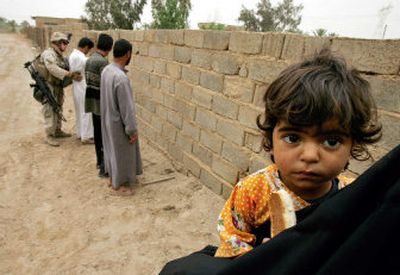Bombs backdrop to political progress

BAGHDAD, Iraq – A string of car bombs detonated in the capital Monday and police found what appeared to be the sites of two mass killings, just days after officials had heralded political progress seen as key to greater stability in Iraq.
Seven car bombs exploded in the morning, killing at least 10 people and wounding about 70, according to police officials and news reports. Across the country, bombings, shootings and mortar attacks killed at least 15 others, and Baghdad police discovered the bodies of 32 security force recruits.
Violence – both the sectarian kind, between Sunni Arabs, Shiites and Kurds, and insurgent attacks on U.S. and Iraqi government forces – has continued unabated since parliament met Saturday to choose a new prime minister to lead Iraq for the next four years.
That parliament meeting broke a four-month deadlock between the country’s ethnic and sectarian groups over who would be named to senior positions in the government. Now the country’s prime minister designate, Jawad al-Maliki, is grappling with the new problem of forming a cabinet. The Shiite leader has been given 30 days to accomplish this delicate task.
In a CNN interview Monday, al-Maliki presented a more compromising image than the tough-talking, sectarian glimpsed in earlier statements he made as a leader of the Dawa party.
“The main challenge that I see is the existence of a torn relationship in the Iraqi community with all the sectarian and ethnic backgrounds,” he said on CNN’s “Your World Today.” “So I have to work first on uniting all of these elements together and work on a national reconciliation on the basis of national dialogue and common interests.”
Ayad Allawi, the leader of a secular coalition that was denied a top government office, said he was skeptical of the new government but would support a reconciliation.
“The current government is based on sectarian and ethnic shares,” Allawi said in an interview at his office in Amman, the Jordanian capital. “We do not believe in sectarian divisions. However, we have a positive approach despite everything, and we will continue to exert efforts in forming a national government, where everybody participates and supervises in decision-making according to experience and qualification, not according to sect, ethnic group or tribe.”
One of al-Maliki’s most challenging initial tasks will be finding competent, politically acceptable leaders for the critical interior and defense ministries. Iraq’s security forces, particularly the Interior Ministry police, have been criticized for abuses. Sunni Arabs accuse the Shiite-led police force of kidnapping and killing Sunnis.
Meanwhile, the police and army troops, who stand guard at almost every major intersection in the capital, face the constant danger of bombings and shootings.
At the trial of Saddam Hussein, prosecutors introduced a 1986 audiotape of a conversation between the president and his vice president, Taha Yassin Ramadan, who described a plan to confiscate farms in the town of Dujail after assassins had tried to kill Saddam there in 1982.
In the recording, Ramadan describes a plan to create an area where the farms would be repopulated with government workers.
“We prepared a list with the names of officers, civil servants and workers to be given pieces of land over there,” Ramadan said. “As for the names who have a security indication against them, a social change will take place and it will be done quietly and gradually.”
A panel of five handwriting experts reported that documents prosecutors have used to tie Saddam to the killing of 148 residents of Dujail are authentic. The new panel confirmed the judgment of another group of three experts.
Defense lawyers argued that a committee of international experts should examine the files.